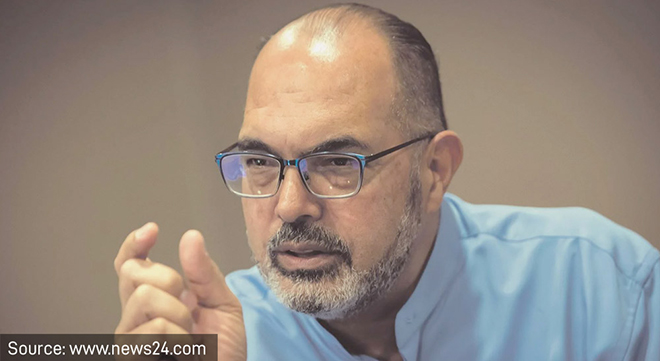Edward Kieswetter has agreed to remain at the helm of the South African Revenue Service (SARS) for the next two years.
In March 2019, President Cyril Ramaphosa appointed Kieswetter in terms of section 6 of the South African Revenue Service Act for a five-year term that started on 1 May 2019.
During a panel discussion hosted by PwC last year, Kieswetter said he would definitely not agree to a second term as commissioner. According to the Daily Investor, Kieswetter cited “selfish interest – like everyone else” as the reason for the decision to step back from his duties when his term expired in 2024.
Thus, the Presidency’s announcement on 27 February that Ramaphosa and Kieswetter have agreed to a two-year term extension comes as somewhat of a welcome surprise.
The reason for the decision, the Presidency said, is “to enable an orderly leadership transition in the organisation”.
Since his appointment five years ago, Kieswetter has been praised for transforming SARS into one of the most effective government agencies in the country. During this time, he boosted tax revenue, even during times of slow economic growth by implementing better measures to ensure tax compliance.
With the country’s economic troubles set to continue for the foreseeable future, Kieswetter will most likely be expected to work his magic again.
Delivering the 2024 Budget Speech, Minister of Finance Enoch Gondongwana said the weak performance of the economy resulted in a sharp deterioration in tax revenue collection for 2023/24. He said the tax revenue for the fiscal year stood at R1.73 trillion – R56.1 billion less than what was expected in the 2023 Budget.
The minister also announced the revised estimate for revenue collection: R1.731 trillion.
Commenting on Godongwana’s strategy for fiscal consolidation over the medium term, Kieswetter said SARS was committed to supporting fiscal consolidation through improved tax administration. The commissioner said that, for the remainder of the fiscal year ending on 31 March 2024, SARS has put “measures” in place to reach the revised estimate.
Tax revenues make up more than 90% of the government’s consolidated budget revenue. The key contributing tax products include VAT (R86bn or 41%,) corporate income tax (R41bn or 19%), personal income tax (R39bn or 18%), customs duties (R15bn or 7%), and dividends tax (R15bn or 7%).
Kieswetter said that to maintain tax revenues at the current level or increase them, it was essential to improve fiscal integrity, in particular, to reduce the need for debt and debt service costs.
In a media statement released following the 2024 Budget, SARS stated that its “strategic intent” was to promote voluntary compliance and fiscal citizenship through implementing key strategic objectives:
- Provide clarity and certainty about tax and customs obligations.
- Make it easy and simple for taxpayers and traders to comply with their tax obligations.
- Make it hard and costly for those who wilfully do not comply.
Focused compliance programme
According to SARS, its focused compliance programme is at the centre of its engagement with taxpayers and traders.
The largest contributors to the compliance programme in the year to date are:
- Initiatives in the large business and international segment yielded R17.2bn, up by R15.7bn from the prior year.
- Following up defaulting taxpayers to collect outstanding debt, which amounts to R70.3bn, up 16.7%, which includes:
- enforcement actions in syndicated tax and customs crimes, which delivered R13.5bn, up 246%;
- efforts to prevent revenue leakage secured R85.6bn, up 38.5%; and
- customs and excise interventions, which resulted in R12.7bn, up 22.1%.
Severe risks to revenue collection
SARS said it must be accepted that the economy was growing extremely slowly, “which was restricting healthier revenue collection”. It was expected that these severe risks would continue to impact revenue collection negatively.
These risks include:
- the fragile global and local economic outlook, exacerbated by the ongoing conflicts in Eastern Europe and the Middle East;
- loadshedding and the subsequent burden on the profitability of companies; and
- inefficiencies at the main seaports, affecting optimum trade.
According to SARS, while imports may be up, “they were nowhere near being enough to compensate for companies’ profitability, which plays a vital role through corporate income tax”.
“Despite mining facing continued pressure, there are other mining activities, such iron ore and chrome, that are seeing positive uptick,” SARS added.
Cautious optimism
SARS stated that year-to-date revenue was under pressure when measured against the Medium-Term Budget Policy Statement estimate of R1.73 trillion.
But there were reasons for cautious optimism.
“February is a high-collection month, as companies are due to submit and pay their CIT provisional tax returns. Apart from normal revenue flows, many taxpayers seek to regularise their tax affairs with SARS before the end of the accounting period,” SARS said.
The revenue service added that March was also a high-collection month, “as high-value CIT provisional tax payments are expected, mainly from large business and international companies”.



